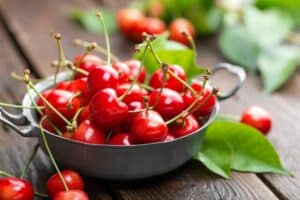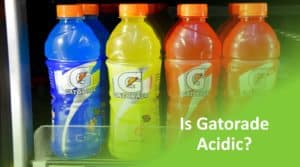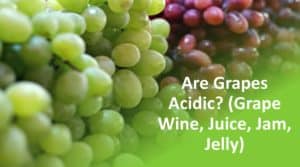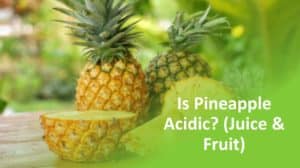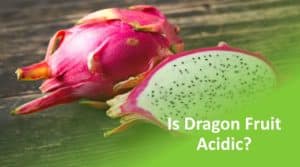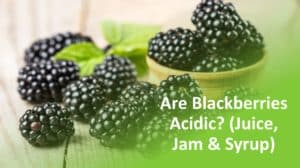With a pH of around 4, apples are Mother Nature’s finest acidic snack.
Having an acidic pH isn’t always a negative thing. Apples are rich in potassium, a mineral that has an alkalizing impact on our bodies once ingested.
Tasty and healthy, they are the best of both worlds. This article will tell you all you need to know about this healthy fruit, its alkalizing properties, and how beneficial it may be for acid reflux.

pH Value of Apples
Apples have a pH between 3 — 4, which makes them acidic. Depending on the variety, their particular pH may vary, but it will still be acidic.
Acidity and alkalinity are measured by the pH scale — the strength of the acid or base of a substance. Seven is the neutral point of the scale, for instance, popcorn.
Anything below seven is acidic, such as strawberries (pH 3 — 3.5) or blueberries (pH 3.11 — 3.33). Everything above seven means alkaline, like conch (8.40), egg white (8), or ripe olives (8).
pH Value of Different Types of Apples
Below is a table showing the pH values of the most popular varieties. Although all of them are acidic, it’s good to know the most acidic ones so you can avoid them.
| Type of Apple | pH Level |
|---|---|
| Red Delicious | 3.9 |
| Golden Delicious | 3.6 |
| Jonathan | 3.33 |
| McIntosh | 3.34 |
| Braeburn | 3.29 |
| Envy | 3.46 |
| Fuji | 3.34 |
| Gala | 3.37 |
| Granny Smith | 3.20 |
| Kanzi | 3.19 |
| Morgenduft | 3.24 |
| Pink Lady | 3.28 |
| Red Chief | 3.33 |
pH Value of Different Apple Products
These sweet and sour fruits are used to make a variety of products. But do their pH levels change when they are processed?
Yes, but only slightly. These byproducts have a slightly higher pH value except for the vinegar, of course. But that one has other benefits that we’ll touch upon later in this article.
| Apple Product | pH level |
|---|---|
| Apple sauce | 3.10 – 3.60 |
| Apple Juice | 3.35 – 4.00 |
| Apples baked with sugar | 3.20 – 3.55 |
| Apple Cider Vinegar | 2.5 |
What Makes Apples Acidic?
These fruits contain two types of acids: malic acid, which makes fruits sour, and ascorbic acid, also known as Vitamin C.
The two acids interact with one another: the more malic acid there is, the higher the Vitamin C levels are. Both acids are more prevalent when the fruit is unripe, and acid concentration decreases as it ripens.
What Makes Apples Alkalizing?
Apples are regarded as alkalizing or alkaline-forming since they contain high amounts of potassium and have a low PRAL score.
When we digest apples (or any food), they leave metabolic waste in our bodies (bits of food components that the body cannot absorb).
This metabolic waste can be neutral, acidic, or alkaline. Alkaline metabolic waste is regarded to be protective and acidic metabolic waste is thought to make you more susceptible to illness and disease.
This is measured using the potential renal acid load scale, or PRAL. High PRAL meals cause your urine and saliva to become acidic. Low PRAL foods increase the pH, making your urine and saliva more alkaline.
Do Apples Cause Acid Reflux & GERD?
They do not cause GERD or acid reflux. In fact, since they are rich in potassium, an alkalizing mineral, they may lessen the symptoms of acid reflux. Alkalinity, after all, counteracts acidity.
Acid reflux is brought on by food traveling up the esophagus instead of down. This condition produces heartburn. If acid reflux happens twice a week or more, then it’s diagnosed as GERD or gastroesophageal reflux disease.
It’s recommended to eat one apple after a meal to neutralize the acid in the stomach. You can eat sweeter ones with lower pH if you’re worried about acid reflux.
Apple juice and sauce lack fiber, so they may be ineffective in treating acid reflux or GERD. Worse, a lack of fiber may aggravate your acid reflux symptoms.
Is Apple Cider Vinegar Good for Acid Reflux?

There is little research to back this up, yet many swear on the benefits of apple cider vinegar (ACV) for preventing acid reflux. One of the symptoms of acid reflux is the low production of hydrochloric acid (the acid in our stomach), and ACV can allegedly help with that.
ACV has a pH of 2.5, so it’s very acidic. While common sense suggests we avoid consuming acidic foods and beverages if we don’t want to deal with acid reflux, there is an opposing argument, according to the proponents of ACV. It can signal the body to shut the lower esophageal sphincter, thus preventing acid backflow.
On the other hand, ACV can worsen the symptoms of acid reflux if you consume it frequently and in large quantities. Also, it’s acidic to the teeth and can damage your teeth enamel.
If you want to try this remedy, make sure you don’t drink ACV while you’re feeling heartburn. Mix a teaspoon in a glass of water five minutes before you start eating.
All in all, more research is needed to evaluate whether apple cider vinegar is an effective and reliable treatment for acid reflux.
Conclusion
To summarize, apples have a pH range of 3 to 4.
Their acidity varies depending on the variety, although all varieties have a pH range of 3.3 to 4. The pH values of juice and sauce made with this fruit are slightly higher, but no more than 4.
Thanks to alkalizing minerals like calcium, potassium, and magnesium, apples do not cause acid reflux and help your body remain alkaline. The old adage that says “an apple a day keeps the doctors away” still applies.

